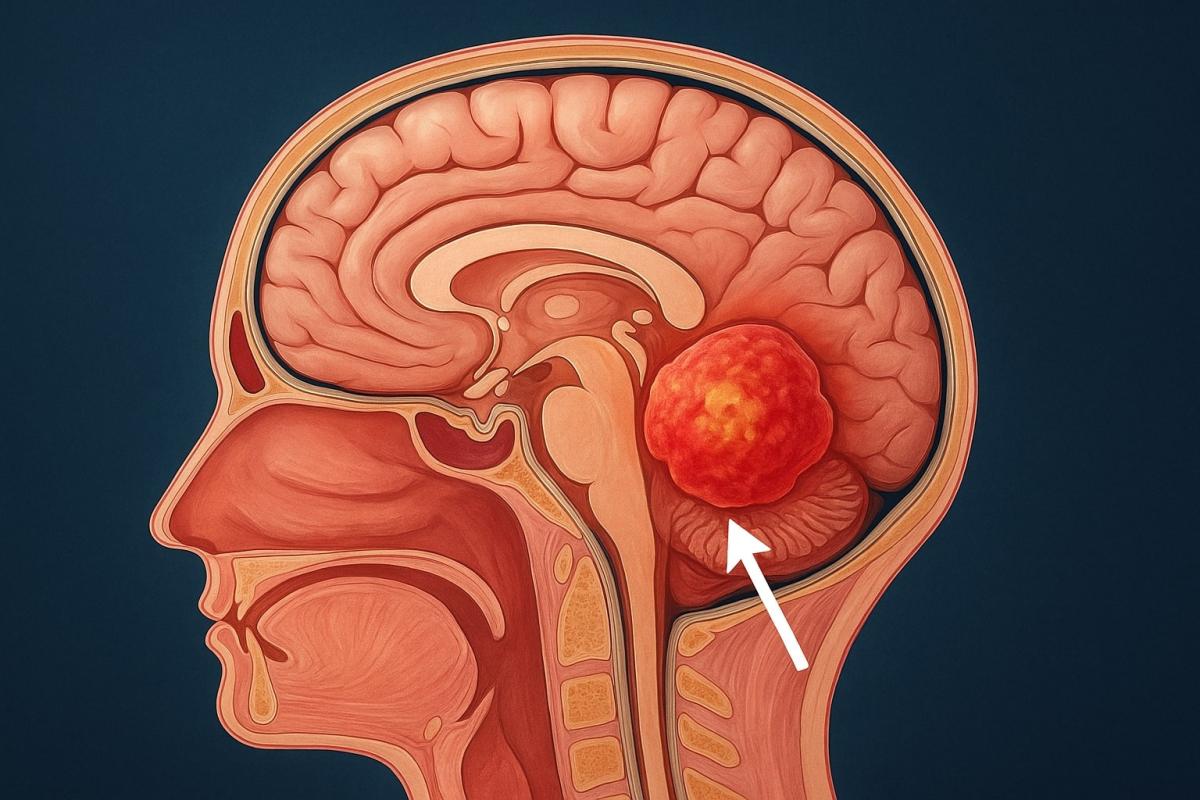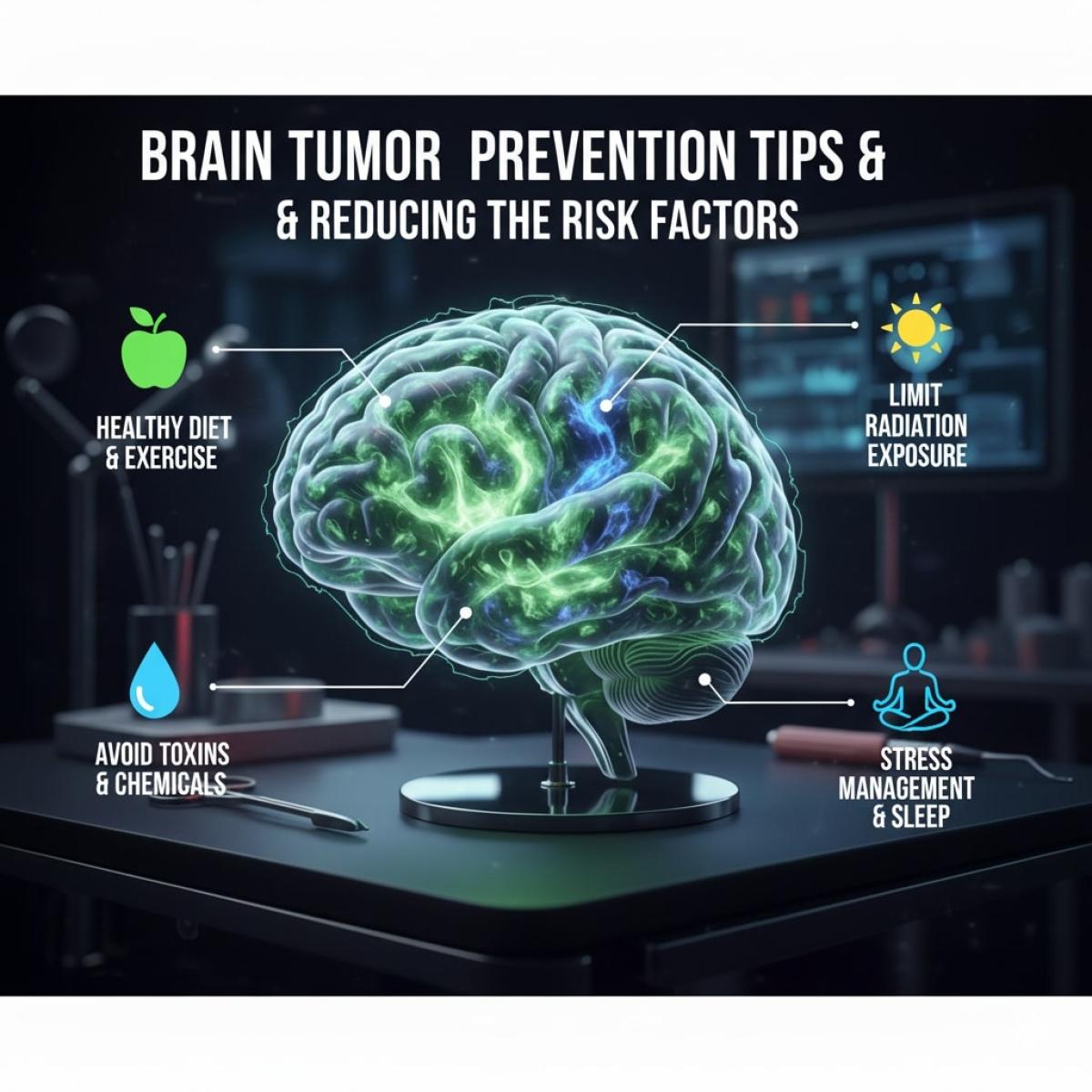Reducing The Risks Of Brain Tumor

Brain tumor
A brain tumor is one of the most complex and challenging neurological disorders affecting millions worldwide. It occurs when abnormal cells grow uncontrollably within the brain or its surrounding tissues, often disrupting critical brain functions such as movement, speech, memory, and balance. While some brain tumors are benign (non-cancerous), others are malignant (cancerous) and can spread rapidly.
Although not all brain tumors can be prevented, since genetics, age, and certain environmental factors play a significant role, understanding the risk factors and adopting a health-conscious lifestyle can significantly lower the chances of developing one. This guide, based on the EEAT (Expertise, Experience, Authoritativeness, and Trustworthiness) framework, provides medically-backed insights into how you can reduce your risk of a brain tumor and maintain optimal brain health.
Understanding Brain Tumor Risks
Before discussing prevention, it’s essential to understand what increases your risk of developing a brain tumor. Research suggests that both genetic and environmental factors contribute to the likelihood of brain tumor formation.
Genetic Predisposition:
Certain inherited genetic conditions, such as neurofibromatosis, Li-Fraumeni syndrome, and Turcot syndrome, are known to increase susceptibility to brain tumors.
Radiation Exposure:
High-dose ionizing radiation, such as radiation therapy to the head during childhood, increases the risk of brain tumors later in life.
Environmental Toxins and Chemicals:
Prolonged exposure to industrial chemicals, pesticides, or solvents may elevate brain cancer risk.
Age and Gender:
Brain tumors can occur at any age, but certain types are more common in children or older adults. Men are slightly more prone to gliomas, while women may be at higher risk of meningiomas.
Lifestyle Factors:
Poor diet, smoking, alcohol consumption, and lack of exercise contribute indirectly by weakening the immune system and overall neurological health.
Understanding these factors is the first step toward reducing your risk of developing a brain tumor.
Preventing Brain tumor
1. Maintain a Brain-Healthy Diet
A balanced, nutrient-rich diet plays a vital role in preventing several diseases, including brain tumors. Research has shown that oxidative stress and chronic inflammation contribute to tumor formation. Consuming antioxidant-rich foods can counter these effects.
Dietary recommendations include:
Increase Antioxidant Intake: Eat fruits like blueberries, strawberries, and oranges, and vegetables such as spinach, kale, and broccoli.
Omega-3 Fatty Acids: Found in fish (salmon, mackerel) and flaxseeds, these fats improve brain function and reduce inflammation.
Limit Processed Foods: Reduce intake of refined sugars, red meats, and processed foods that may contain nitrosamines, compounds linked to cancer risk.
Hydration: Drink adequate water daily to support brain metabolism and toxin elimination.
Green Tea: Contains polyphenols, which may help combat tumor growth through antioxidant properties.
2. Avoid Smoking and Limit Alcohol Consumption
Smoking introduces carcinogens that can damage DNA and increase the likelihood of cancerous cell growth, including within the brain. Similarly, excessive alcohol consumption has been linked to increased oxidative stress and neurological damage.
Quit smoking completely and avoid second-hand smoke exposure.
Moderate alcohol use (or abstinence) is strongly advised for brain health.
Join de-addiction programs if quitting feels difficult, professional guidance can significantly increase success rates.
3. Limit Exposure to Radiation
Radiation exposure, especially to the head has a clear link with the development of brain tumors. While medical imaging such as CT scans is sometimes necessary, overexposure should be avoided.
Avoid unnecessary radiation-based diagnostics.
Ask your doctor about MRI alternatives when possible, as MRI uses magnetic fields rather than ionizing radiation.
Occupational safety: If you work in an environment involving radiation, always follow protective guidelines and wear shielding gear.
4. Use Electronic Devices Safely
There is ongoing debate about the long-term effects of mobile phone radiation on brain health. While no conclusive evidence proves that cell phone use causes brain tumors, it’s wise to practice precautionary measures:
Use speaker mode or wired earphones instead of holding the phone close to your ear.
Avoid long-duration calls when the signal is weak (as phones emit higher radiation then).
Keep devices away from your head while sleeping.
These small habits can reduce your cumulative exposure to electromagnetic radiation over time.
5. Strengthen Your Immune System
A robust immune system helps detect and destroy abnormal cells before they become cancerous. To strengthen immunity:
Exercise regularly: Aim for 30 minutes of moderate activity (e.g., walking, cycling) five times a week
Sleep adequately: Quality sleep supports brain repair and immune balance.
Manage stress: Chronic stress weakens immunity. Practice mindfulness, meditation, or yoga to maintain emotional stability.
Avoid chronic infections: Maintain hygiene and vaccination schedules to protect against viral infections linked with tumor risks.
6. Avoid Exposure to Harmful Chemicals
People working in chemical industries, agriculture, or construction are often exposed to carcinogenic substances. Protective measures include:
Using personal protective equipment (PPE) at the workplace.
Avoiding inhalation of fumes or pesticides without proper safety gear.
Choosing eco-friendly household products instead of those with harsh chemical compositions.
Regularly ventilating living and work areas to reduce inhalation of toxic compounds.
7. Be Aware of Family Medical History
If you have a family history of brain tumors or genetic syndromes associated with cancer, it’s important to inform your healthcare provider. Genetic counseling can help assess risks and determine if regular monitoring or preventive testing is needed.
Early detection in genetically susceptible individuals can be lifesaving.
8. Regular Medical Check-Ups
Routine medical evaluations can help detect neurological issues early. If you experience persistent headaches, vision problems, or unexplained seizures, seek medical attention promptly.
Periodic neurological assessments for those with risk factors.
MRI or brain imaging when clinically recommended.
Discuss lifestyle risks with a qualified neurologist or oncologist for personalized preventive strategies.
9. Manage Stress and Mental Health
Chronic stress not only weakens the immune system but also contributes to hormonal imbalances that may indirectly affect brain function. Incorporate mental well-being practices into your daily routine:
Practice mindfulness meditation for relaxation.
Spend time in nature or pursue hobbies to boost mood.
Seek counseling if you experience anxiety, depression, or burnout.

10. Explore More on Prevention
Understanding how to take proactive steps is crucial. For a detailed insight into effective prevention methods, you can read our comprehensive guide: How to Prevent Brain Tumor -this article provides a deeper understanding of preventive measures and expert recommendations for long-term brain health.
🧩 11. Early Detection is Key
While prevention focuses on reducing risks, early detection can dramatically improve outcomes if a tumor does develop. Awareness of the following symptoms can aid in early diagnosis:
Frequent headaches
Unexplained nausea or vomiting
Vision or hearing difficulties
Seizures or loss of balance
Changes in personality or cognition
If these symptoms persist, consult a neurologist immediately.
Conclusion
Reducing the risk of a brain tumor involves a combination of healthy living, environmental caution, and regular medical care. By following brain-protective habits like eating antioxidant-rich foods, avoiding tobacco, limiting radiation exposure, managing stress, and maintaining overall wellness you significantly lower your chances of tumor development.
While not all risks can be eliminated, awareness and proactive action empower you to safeguard your brain health effectively. Stay informed, live healthily, and consult trusted healthcare providers like Amcare Hospital for expert neurological guidance and preventive care.